 Criminal Investigation
Exam or Detective
Exam
Criminal Investigation
Exam or Detective
Exam
Promotional exams and assessments for this topic are the toughest detective, corporal, sergeant and lieutenant exams out there.
Here are the textbooks you should use to prepare for your assignment or promotion to detective or investigator in a police or sheriff's department. Police promotion exams with up to 500+ questions, from over 150 great textbooks, are now available.
![]() Here is our
current list of all
150+
police promotion exams
Here is our
current list of all
150+
police promotion exams
What are the best textbooks to study TODAY for your future Criminal Investigation, Detective or Investigator exam?
"I also spent 7 years as commander of my agency's CID - criminal investigation Division.The field of criminal investigation is such a technology-dependent and progress-intensive topic in law enforcement today that the body if knowledge is constantly changing, and the textbooks and the promotion exams and test questions from those textbooks MUST be constantly updated.
And - yes - it is true that assignment as a detective, detective sergeant or detective lieutenant are the 3 best positions in law enforcement."
- Lt. Paul Patti (ret)
Promotional Exams for Criminal Investigation and other police promotion textbooks can be taken by you to use as study material within the Advanced Police Promotional Testing Course. Try a few short, sample exams and online flashcards - at no cost. You'll receive an email with your login in the next few minutes. Then learn more about our police promotion exams, flashcards and download our expert study system!
My BEST piece of advice on this page? If you believe you are taking a detective exam at any time in the future, you need to own and constantly read the material in the below textbooks. The current edition of each of these textbooks represent nearly a total body of professional knowledge on the topic of criminal investigation and form an impressive detective exam study guide.
Going back to the 1980's and 1990's there were just two or three comprehensive and widely respected textbooks in the area of law enforcement general criminal investigation. Truth is, they were such classics, they were seldom updated or revised. When the storm of DNA advancements and crime scene investigation technology hit (not to mention the CSI TV shows!) many of these classic textbooks could not be updated with new editions quick enough to keep up. Many new textbooks were written, diving deeply into the groundbreaking areas of DNA analysis, biometrics and all the technology advances.
There have been dozens of books written about criminal investigation standards and techniques, but my favorite ones that appear in many detective exams (not in any order) are;
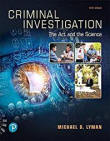 Criminal
Investigation - the Art and the Science 9th Edition by Michael D. Lyman.
This CI textbook is unique in that it explores the past experience
of investigators as well as new and emerging techniques in forensic
science. The author focuses on the steps and considerations involved
in actual criminal investigations, and examines the many external
variables than can influence an investigator’s success in the field.
The new 9th Edition includes an extensive new chapter focising on
the Investigation of Officer-Involved Shootings.
Visit us for the
Criminal Investigation - the Art and the Science exam, test
questions, study guide and flashcards.
Criminal
Investigation - the Art and the Science 9th Edition by Michael D. Lyman.
This CI textbook is unique in that it explores the past experience
of investigators as well as new and emerging techniques in forensic
science. The author focuses on the steps and considerations involved
in actual criminal investigations, and examines the many external
variables than can influence an investigator’s success in the field.
The new 9th Edition includes an extensive new chapter focising on
the Investigation of Officer-Involved Shootings.
Visit us for the
Criminal Investigation - the Art and the Science exam, test
questions, study guide and flashcards. Criminal
Investigation by Michael D. Lyman.
An affordable, thought-provoking look at criminal
investigations, focusing on core concepts. Lyman presents
information that parallels the steps and considerations observed in
an actual criminal investigation, blending scientific theories of
crime detection with a practical approach to criminal investigation.
Visit us for the
Criminal
Investigation exam, test questions, study guide and flashcards.
Criminal
Investigation by Michael D. Lyman.
An affordable, thought-provoking look at criminal
investigations, focusing on core concepts. Lyman presents
information that parallels the steps and considerations observed in
an actual criminal investigation, blending scientific theories of
crime detection with a practical approach to criminal investigation.
Visit us for the
Criminal
Investigation exam, test questions, study guide and flashcards.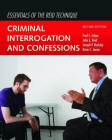 Fundamentals
of the Reid Technique - Interrogation and Confessions 2E
Fundamentals
of the Reid Technique - Interrogation and Confessions 2EPracticed worldwide, the Reid Technique® is the leading approach to interview and interrogation practices. Since 1962, hundreds of thousands of investigators have received training in the Reid Technique through Criminal Interrogation and Confessions.
The updated, abridged version of this best-seller is now available in a new 2nd edition from the experts at John E. Reid and Associates, Inc. Criminal Interrogation and Confessions teaches readers how to identify and interpret verbal and nonverbal behaviors of both deceptive and truthful people, and how to move toward obtaining solid confessions from guilty persons. The Reid Technique is built around basic psychological principles and presents interrogation as an easily understood nine-step process. Separated into two parts, What You Need to Know About Interrogation and Employing the Reid Nine Steps of Interrogation, this book will help readers understand the effective and proper way that a suspect should be interrogated and the safeguards that should be in place to ensure the integrity of the confession.
Fundamentals of the Reid Technique - Interrogation and Confessions 2E - exam, test questions, study guide and flashcards
 O'Hara's
Fundamentals of Criminal Investigation has served as the 'Bible'
of criminal investigation for many years. Thousands of detective
exam questions are sourced from this textbook. The author of this new
9th edition has prepared this text for a new generation of criminal
investigators in such a way that they will learn what is meant by a
complete investigation and acquaint themselves with the proofs of
the most important crimes. In addition, they will become familiar
with the employment of technical methods and services that are
available. The tools of the investigator are referred to as the
three 'I's,' namely, 'Information,' 'Interrogation,' and
'Instrumentation.' In view of this factor, the technological
advancements in forensic science, practices of criminalistics,
computerization, electronic databases, and the Internet are
presented, including the time honored methods of collecting
information that are still effective and utilized.
O'Hara's
Fundamentals of Criminal Investigation 9E 2019 - exam, test
questions, study guide and flashcards.
O'Hara's
Fundamentals of Criminal Investigation has served as the 'Bible'
of criminal investigation for many years. Thousands of detective
exam questions are sourced from this textbook. The author of this new
9th edition has prepared this text for a new generation of criminal
investigators in such a way that they will learn what is meant by a
complete investigation and acquaint themselves with the proofs of
the most important crimes. In addition, they will become familiar
with the employment of technical methods and services that are
available. The tools of the investigator are referred to as the
three 'I's,' namely, 'Information,' 'Interrogation,' and
'Instrumentation.' In view of this factor, the technological
advancements in forensic science, practices of criminalistics,
computerization, electronic databases, and the Internet are
presented, including the time honored methods of collecting
information that are still effective and utilized.
O'Hara's
Fundamentals of Criminal Investigation 9E 2019 - exam, test
questions, study guide and flashcards.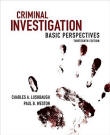 Criminal
Investigation - Basic Perspectives, by Lushbaugh and Weston.
This book is very concise and well-organized, it presents the most
recent investigative techniques and features real-life case studies
to develop an investigator's ability to analyze, evaluate, and
reason through a criminal investigation. Because of the
author’s 50+ years of experience, this comprehensive textbook gives
students a complete introduction to and understanding of the police
investigative process. Visit us for the
Criminal Investigation - Basic Perspectives exam, test questions,
study guide and flashcards.
Criminal
Investigation - Basic Perspectives, by Lushbaugh and Weston.
This book is very concise and well-organized, it presents the most
recent investigative techniques and features real-life case studies
to develop an investigator's ability to analyze, evaluate, and
reason through a criminal investigation. Because of the
author’s 50+ years of experience, this comprehensive textbook gives
students a complete introduction to and understanding of the police
investigative process. Visit us for the
Criminal Investigation - Basic Perspectives exam, test questions,
study guide and flashcards.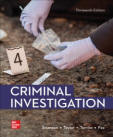 Criminal
Investigation - Swanson, Chamelin, Territo and Taylor 13th Edition - This is
one of the most comprehensive textbooks in criminal investigation.
It is a practical, step-by-step introduction to criminal
investigation within a logical framework for understanding the
investigative process. Covers videotaping of crime scenes,
investigating street gangs, drug enforcement and dozens of other
important, current topics. Does a very good
job explaining the practical aspects of investigation in light of
the difficult scientific concepts. Visit us for the
Criminal Investigation - Swanson exam, test questions, study guide
and flashcards.
Criminal
Investigation - Swanson, Chamelin, Territo and Taylor 13th Edition - This is
one of the most comprehensive textbooks in criminal investigation.
It is a practical, step-by-step introduction to criminal
investigation within a logical framework for understanding the
investigative process. Covers videotaping of crime scenes,
investigating street gangs, drug enforcement and dozens of other
important, current topics. Does a very good
job explaining the practical aspects of investigation in light of
the difficult scientific concepts. Visit us for the
Criminal Investigation - Swanson exam, test questions, study guide
and flashcards.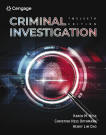 Criminal
Investigation - Hess and Orthmann 12th Edition - this textbook has a
practical, field-based approach to modern investigative principles
and practices. It introduces the latest innovations in technology
and science to give you a broad perspective of criminal
investigations as it is practiced today. There is a lot of great
detective
exam subject matter in the coverage of DNA, terrorism,
cybercrime, forensics, physical evidence, investigative photography
and sketching, identity theft, white-collar crime, ethics, and many
other current topics. Visit us for the
Criminal Investigation - Hess exam, test questions, study guide and
flashcards.
Criminal
Investigation - Hess and Orthmann 12th Edition - this textbook has a
practical, field-based approach to modern investigative principles
and practices. It introduces the latest innovations in technology
and science to give you a broad perspective of criminal
investigations as it is practiced today. There is a lot of great
detective
exam subject matter in the coverage of DNA, terrorism,
cybercrime, forensics, physical evidence, investigative photography
and sketching, identity theft, white-collar crime, ethics, and many
other current topics. Visit us for the
Criminal Investigation - Hess exam, test questions, study guide and
flashcards. Promotional Exams for all these
textbooks can be taken by you to use as study
material within the
Advanced
Police Promotional Testing Course at
PoliceCareer.com.
Promotional Exams for all these
textbooks can be taken by you to use as study
material within the
Advanced
Police Promotional Testing Course at
PoliceCareer.com.Some of the most important concepts you will need to know for your detective promotion exam:
Having an in-depth knowledge of all these topics is crucial for a career in criminal investigations. Also, each of these topics will branch off into similar and related topics. Follow those branches!
Respond to this police detective, corporal, sergeant or lieutenant oral board question:
How would YOU describe your knowledge and experience in criminal investigation?"
"Ever since my first days in field training, and then while on patrol on my own, I have excelled in report writing and investigative techniques.
I pushed myself to learn all about physical evidence, scientific methods of evidence collection, and all the latest information on witness and suspect interrogation.
Most important, if ever time permitted, I always followed up and took an investigation as far as I could, a great many times making an arrest on a case that normally would have been turned over to a detective.
There is nothing I aspire to more than putting all these talents to work in our agency's detective division."
-
deductive reasoning
-
reconstructive process
-
modus operandi
-
Locard's principle
-
equivocal death
-
crime mapping
-
geographic profiling
-
exculpatory evidence
-
DNA analysis
-
pictometry
-
contemporaneous writing
-
ultraviolet-light photography
-
rectangular-coordinate method
-
Exif meta data
coding
- You know about guns - how about
ballistics?
-
baseline method
-
binary explosive
-
bloodstain pattern analysis
-
cross-projection method
-
corpus deliciti evidence
-
associative evidence
-
silver nitrate method
Sign up for our police promotion newsletters. You will be able to take free promotion exams online to try out our system, including questions from criminal investigation textbooks, and also receive information on police oral boards, in-basket and assessment center topics.
Send me Exam and Assessment questions you have faced - one of the column features is that I will research and comment on written exam or assessment center questions you have heard, answered or encountered and that you are unsure or curious about. We will be glad to give you our expert opinion on questions you have seen asked on exams and exercises. Send your questions to me directly - Paul@PoliceCareer.com.
Police Corporal - Sergeant Lieutenant - Captain and Above Promotion Testing
Corporal Exam
Sergeant Exam
Lieutenant Exam
Captain Exam
Management and Administration Exams
Promotion Oral Boards (Detective, Corporal, Sergeant and above)
Promotion Assessment Centers (Sergeant and above)
Police Promotion In-Basket (Sergeant and above)

The #1 BEST WAY to Prepare for Police Promotion Exams? Study the Textbooks!
Patrol and Field Operations
Criminal Investigation
Community and Problem-oriented Policing - POP/COP
Police Ethics
Intelligence-Led Policing
Police Legal Textbooks - Law Officer's Pocket Manual and others
Police Leadership
Police Special Topics and Titles, such as below;
Criminal Investigation Test Questions that typically appear in Det. Sgt. and Lt. promotion exams
When submitting documents for handwriting or paper
identification and comparison purposes, submit them in
(A)
plastic bags
(B) paper containers
(C) airtight glass
containers
(D) vacuum-sealed metal containers
(E)
cellophane envelopes and an outside manila envelope
(F) none
of the above
What type of light and/or substance should be used to detect
invisible laundry marks?
(A) UV
(B) IR
(C) luminol
(D) ninhydrin
The interview style which is especially effective for obtaining
information from victims and witnesses who have difficulty
remembering an event is called the ____________ interview.
(A) Mnemonic
(B) Hypnotic
(C) Hypersensory
(D) Focused
(E) Cognitive
In Geographic Profiling, investigators seek to take advantage of
the fact that the serial criminal operates within
(A) a
comfort zone
(B) a short distance from their home or place of
work
(C) a geographic area that holds special meaning to them
(D) a geographic area where the past victims can help identify
future victims
Which of the below forms of homicide results from extreme
culpable negligence? (check all that apply):
(A) involuntary
manslaughter
(B) voluntary manslaughter
(C) third-degree
murder
(D) second-degree murderd
